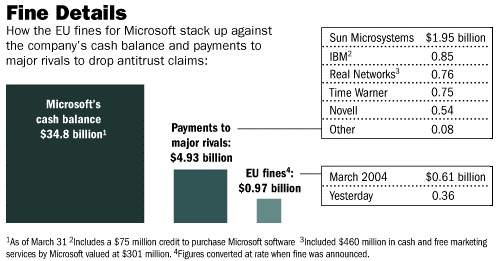
Microsoft's run-ins with European data protection authorities are only half the story.
"The most high-profile of these investigations were those conducted by the US Department of Justice (DoJ) and the European Commission."The real action started when the DoJ and the Attorney Generals of twenty states sued Microsoft in 1998 for unreasonably restraining competition by expanding and abusing its monopoly position and for breaching the 1994 settlement, by tying its web browser, Internet Explorer, to the Windows operating system.
On April 3, 2000 Judge Jackson of the U.S. District Court for the District of Columbia issued a ruling that stated that Microsoft had violated sections 1 and 2 of the Sherman Act. Judge Jackson ordered the break-up of Microsoft into two separate units, one to produce the Internet/WWW browser and one to produce the operating system.
The case dragged on through the appeal courts until 2001 when the DoJ and Microsoft reached a settlement which enabled Microsoft to avoid the threatened break-up of its operations.

Microsoft's anti-competitive activities also attracted the scrutiny of the EU Commission
"The case dragged on through the appeal courts until 2001 when the DoJ and Microsoft reached a settlement which enabled Microsoft to avoid the threatened break-up of its operations."During the course of its investigation, the Commission broadened the scope of its inquiry to include, amongst other things, Microsoft’s conduct in relation to its Windows Media Player.
That investigation resulted in a preliminary finding, issued in August 2001, stating that Microsoft had abused its dominant position by hindering the interoperability between its operating system and third-party workgroup server operating systems and by tying its Windows Media Player to the Windows operating system.
In March 2004, the EU Commission ordered Microsoft to pay € 497 million (USD€ 794 million), the largest fine ever handed out by the EU at the time, in addition to the previous penalties, which included 120 days to divulge the server information and 90 days to produce a version of the Windows operating system without Windows Media Player.
Microsoft initiated an unsuccessful action for annulment with the Court of First Instance (CFI) which rendered its final judgment on 17 September 2007. A compliance agreement between the Commission and Microsoft was reached on 22 October 2007.

EU fines for anti-trust violations were small potatoes for cash-rich Microsoft
"That investigation resulted in a preliminary finding, issued in August 2001, stating that Microsoft had abused its dominant position by hindering the interoperability between its operating system and third-party workgroup server operating systems and by tying its Windows Media Player to the Windows operating system."In March 2009 it was reported that the EU was scaling back its monitoring of Microsoft's adherence to the 2004 antitrust ruling because "the company's good behaviour meant that full-time supervision was no longer needed".
Since then Microsoft has for the most part managed to stay off the radar of anti-trust authorities although there have been occasional complaints filed against it for allegedly anti-competitive behaviour, for example the complaint filed by Moscow-based cyber security firm Kaspersky Lab in 2017 which was subsequently withdrawn following an amicable settlement.
More recently in July last year news broke of a fresh anti-trust complaint against Microsoft filed with the European Commission by Slack Technologies.
"Unless an amicable settlement is reached - which seems unlikely in this case - it could well be that Microsoft's controversial "software bundling" practices will be back in the headlines again."The essence of Slack's grievance is that Microsoft has illegally tied its Teams product into its market-dominant Office productivity suite, force-installing the software for millions, blocking its removal, and hiding the true cost to users. Slack has called for Teams to be separated from Office 365 and for a market rate to be charged for the service.
Unless an amicable settlement is reached - which seems unlikely in this case - it could well be that Microsoft's controversial "software bundling" practices will be back in the headlines again.
In the next part we will see how the US DoJ's scrutiny of Microsoft has not been limited to the investigation of anti-competitive practices but has extended to alleged infractions of the US Foreign Corrupt Practices Act. ⬆